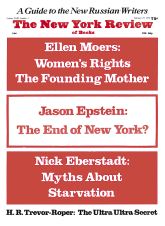In response to:
Hello to All That from the October 16, 1975 issue
To the Editors:
To repeat Leavis’s phrase, but change the referent, “Rosenberg has had bad luck.” He was killed April 1, 1918. And what remained of his The Complete Works (1937) was destroyed in the Second War when the Simpkin Marshall warehouse was bombed. Rosenberg’s untiring advocate, his sister Annie Wynick, was destroyed in a grotesque accident in 1961. And now he gets Karl Miller [NYR, October 16].
“Break of Day in the Trenches” is a very good poem, and there are others: all written after he had enlisted [my italics]. But most of his poems are very bad: Marsh’s despised Georgian doubts often made sense.
Notice how “very bad” echoes Marsh’s opinion of Rosenberg’s playlet Moses—“ridiculously bad.” And this reinforces my query about Miller’s “very bad.” Which poems: or rather, since the proportion is against Rosenberg, which are, in Miller’s opinion, the “good” poems? Had he named them, and qualified his rigid sweep of judgment, we might have got some insight into how the critical judgment works; instead the self-validating, self-relishing opinion gets its flourish in “very bad.” If “Break of Day” is a “good” poem, what are those attributes which differentiate it from the “very bad” poems? If we don’t know on what basis Mr. Miller judges, how are we to be persuaded that even this poem achieves its status? If you think, as I do, that Rosenberg’s work is of a piece, “Break of Day” would exhibit representative qualities of Rosenberg’s work that would make it more difficult to dismiss most of his poems.
There is also the judgmental shoddiness of “after he had enlisted.” What is so magical about enlistment? Does it bring about the writing of good poems? Why were there not more good poems, written by those enlisting soldiers who aspired to write, if this is so? What does “enlistment” designate? Is it the period immediately subsequent to joining up, or does it begin with the period in the trenches? One asks these questions not because of the wish for more precision, though this wouldn’t come amiss in Mr. Miller’s glistening rhetoric, but because were “enlistment” more precisely used, we might determine not only which poems (and why) are in Miller’s opinion “good,” but also learn how the critical judgment meshes with the sociological guess-work that seems to judder behind the idea of “enlistment.” Rosenberg enlisted November 1915; he left for France early June, and by the fifteenth was in the trenches. One feels certain that Mr. Miller will be able to date those poems which were written “after enlistment,” be able to distinguish those poems belonging to the period of home training from those of the trench; and be able to apportion a rising scale of merit to those written as the poet began to directly experience war. Rosenberg wasn’t so sure:
I suppose I could write a bit if I tried to work at a letter as an idea—but sitting down to it here after a days dull stupifying labour—I feel stupified. When will we go on with the things that endure? [Letter to John Rodker, c. 1916]
But isn’t there something curious about Miller’s opinion of the “good” poetry—what there is of it—“all” having been written “after enlistment”? Doesn’t it work, or rather isn’t it made to do heavy duty so that Rosenberg’s “good” poetry may be categorized as “war poetry,” if not for the purposes of a review, then perhaps for the conveniences of appraisal?
Jon Silkin
Newcastle upon Tyne, England
This Issue
February 19, 1976



